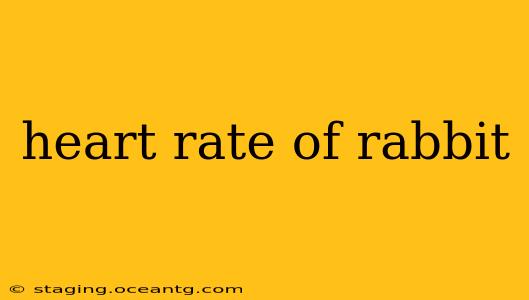Rabbits are beloved pets known for their gentle nature and unique personalities. However, understanding their health is crucial for responsible ownership. One vital indicator of a rabbit's well-being is its heart rate. Knowing what's normal and what constitutes a cause for concern can make a significant difference in providing timely veterinary care. This guide will delve into the intricacies of rabbit heart rates, covering everything from normal ranges to potential causes of abnormalities.
What is the normal heart rate for a rabbit?
A healthy adult rabbit's resting heart rate typically ranges from 120 to 180 beats per minute (bpm). However, various factors can influence this rate. Younger rabbits, for instance, tend to have slightly faster heart rates than adults. Furthermore, stress, excitement, or even exertion can temporarily elevate the heart rate. It's important to remember that these fluctuations are normal, and a single elevated reading doesn't necessarily signal a problem. Consistent monitoring is key to establishing a baseline for your individual rabbit. To get the most accurate reading, it's best to take the measurement when your rabbit is calm and relaxed.
How to check your rabbit's heart rate?
Checking your rabbit's heart rate requires a gentle and careful approach. The best place to listen is on the left side of the chest, just behind the elbow. You can use a stethoscope for a clearer reading, but if you don't have one, you can carefully place your ear against your rabbit's chest. Count the number of beats for 15 seconds and multiply by four to get the beats per minute. Remember to handle your rabbit gently to avoid causing stress, which can skew the results. If you are uncomfortable or unsure about this procedure, seek guidance from your veterinarian.
What causes a fast heart rate in rabbits?
A rapid heart rate, or tachycardia, in rabbits can stem from various underlying issues. Some common causes include:
- Stress and fear: Loud noises, unfamiliar environments, or handling can all trigger a rapid heart rate.
- Pain and discomfort: Illness, injury, or dental problems can cause significant distress and lead to an increased heart rate.
- Hyperthyroidism: An overactive thyroid gland can accelerate the metabolism and result in a fast heart rate.
- Heat stroke: Overheating can significantly stress a rabbit's system, leading to a rapid heartbeat.
- Heart disease: Various heart conditions can cause a persistently elevated heart rate.
What causes a slow heart rate in rabbits?
While a fast heart rate is more commonly observed, a slow heart rate, or bradycardia, can also indicate a problem. This could be caused by:
- Certain medications: Some medications can depress the heart rate.
- Electrolyte imbalances: Disruptions in the balance of electrolytes can affect heart function.
- Underlying heart disease: Bradycardia can also be a symptom of certain types of heart disease.
- Hypothermia: Extreme cold can slow the metabolic rate and the heart rate.
When should I take my rabbit to the vet for a heart rate check?
You should contact your veterinarian if you notice any of the following:
- A persistently fast or slow heart rate outside the normal range.
- Difficulty breathing alongside an abnormal heart rate.
- Lethargy or weakness.
- Changes in appetite or bowel movements.
- Any other concerning symptoms.
How is a rabbit's heart rate measured by a vet?
Veterinarians utilize several methods to accurately measure a rabbit's heart rate. Besides auscultation (listening with a stethoscope), they may employ electrocardiography (ECG) for a more detailed assessment of the heart's electrical activity. This provides a more comprehensive understanding of the heart's rhythm and function, helping identify potential underlying conditions.
Regular monitoring of your rabbit's heart rate, combined with vigilant observation of its overall health and behavior, is crucial for early detection of potential problems. Remember that this information is for educational purposes only and should not substitute professional veterinary advice. Always consult your veterinarian for any concerns about your rabbit's health.
